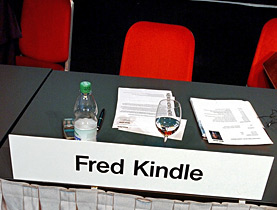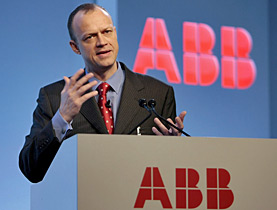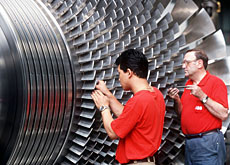Conservative Kindle surplus to requirements

The abrupt and confusing departure of ABB chief executive Fred Kindle has led to speculation that he may have been a victim of his cautious management style.
The official reason given on Wednesday was “irreconcilable differences of opinion about how to lead the company”. Kindle trod a conservative and successful path at the Swiss-Swedish engineering group.
Brought in from Sulzer by former CEO and chairman Jürgen Dormann, the ex-McKinsey consultant was groomed to continue his mentor’s sustainable strategy that brought ABB back from the brink of bankruptcy in the late 1990s.
Current ABB chairman Hubertus von Grünberg heaped lavish praise on Kindle and denied the split was caused by a clash of egos or a disagreement on spending the firm’s cash pile.
But Kindle’s own opinion on how to lead the company was based on a measured, no-frills approach. He made no secret of the fact that he treated shareholders’ money as if it was his own.
“He was always seen as erring on the side of caution rather than being progressive. He was a classic McKinsey alumni, a very fast thinker who based his reasoning on arguments and fundamentals and rather less on gut feeling,” Bank Vontobel analyst Panagiotis Spiliopoulos told swissinfo.
“He was not an elevated CEO, but was always down to earth. He always played down his own contribution to a very low level and definitely led by example.
“He always said he had to build ABB for the next three or four years and not for the next quarter. A lot of people would have liked to see ABB become more aggressive.”
Expansive calls
ABB has enjoyed a profitable few years, fuelled by increasing energy demands from emerging economies and crumbling power infrastructure in Europe. Net income more than doubled to SFr4.18 billion ($3.8 billion) in 2007 and the firm’s order books are full.
Mark Diethelm, an analyst at Zurich Cantonal Bank, agreed that there have been calls for a more expansive policy as the company moved out of its restructuring phase into a period of sustained growth.
But he argued that the company should be cautious about loosening the reins too much.
“In a situation where industrial companies are confronted with slowing growth, you like these companies to have a good cash position,” he told swissinfo. “Looking at their organic growth, why should they need an acquisition? At the moment prices are too high.”
ABB’s share price plummeted six per cent on the news of Kindle’s shock departure and remained in negative territory all day.
“Fred Kindle was a respected manager and investors trusted him. His departure and the fact that no clear explanation was given significantly raises uncertainty about the company,” Julius Bär analyst Britta Simon told swissinfo.
ABB said on Wednesday that the company’s strategy would remain unchanged in the short-term and announced a modest SFr2.2 billion share buyback programme. But all eyes will be on who takes over at the helm.
swissinfo, Matthew Allen in Zurich
Kindle, born in 1959, is a joint Swiss/Liechtenstein citizen. He joined ABB in 2004 and became president and CEO in January 2005.
He started his professional career as a consultant with McKinsey in New York and Zurich and also worked with the technology company Hilti.
He then took a job with Sulzer in 1992. He became CEO in 2001 and led the company through a period of change.
ABB specialises in heavy industrial electrical switches, transformers, generators, circuit breakers, cables and related software and communications systems. Such products are typically used by power plants, oil and gas companies.
ABB operates in about 100 countries and employs more than 110,000 people.
Full-year 2007 net income was SFr4.18 billion ($3.8 billion) (+271%)including exceptional gains of SFr1.11 billion.
ABB will propose a dividend of SFr0.48 per share in the form of a nominal value reduction.
It will start a share buyback programme up to a maximum value of SFr2.2 billion.

In compliance with the JTI standards
More: SWI swissinfo.ch certified by the Journalism Trust Initiative



You can find an overview of ongoing debates with our journalists here. Please join us!
If you want to start a conversation about a topic raised in this article or want to report factual errors, email us at english@swissinfo.ch.